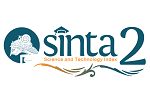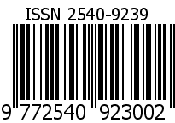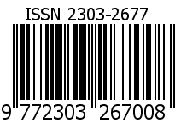Public reading interest through utilization of iPusnas National Library of the Republic of Indonesia
Abstract
Reading activities can reach an optimal level if individuals have a high interest in reading. iPusnas is one of the media that can increase public reading interest. This study aimed to determine the correlation between public reading interest and the iPusnas National Library of the Republic of Indonesia by analyzing academic needs, professional needs, improved welfare, and increased income. This study used a quantitative approach with a survey method on the community of iPusnas users. The sampling technique used was quota sampling with a sample size (n) of 444. The data collection technique used was primary data obtained through online questionnaires filled out by respondents, and literature studies to strengthen the research results. The results of the study indicated that the reading interest of iPusnas users had a relationship pattern with the fulfillment of various needs and user interests through ease of access and the availability of up-to-date collections. In terms of academic needs, professional needs, and improving welfare, the correlation coefficient was moderate. Besides, in the aspect of increasing income, the correlation coefficient figure was below moderate. This showed that the iPusnas application was more effective in supporting educational and professional needs than the income aspect. This study concludes that the iPusnas application is effective in fostering reading interest through the provision of access to relevant and quality information according to the needs and interests of iPusnas users.
Keywords
Full Text:
PDFReferences
Aini, E. N., Isnaini, I., & Sukamti, S. (2018). Pengaruh tingkat pendidikan terhadap tingkat kesejahteraan masyarakat di Kelurahan Kesatrian Kota Malang. Technomedia Journal, 3(1), 58–72. https://doi.org/https://doi.org/10.33050/tmj.v3i1.333
Alroy, M., & Sa’diyah, I. (2021). Pengaruh aplikasi mobile Ipusnas terhadap perkembangan minat baca masyarakat. Sitasi: Seminar Nasional Teknologi Dan Sistem Informasi, 1(1), 149–155. https://doi.org/https://doi.org/10.33005/sitasi.v1i1.33
Alsaeedi, S. Z., Ngadiran, N., Kadir, Z. A., Altowayti, W. A. H., & Al-Rahmi, W. M. (2021). Reading habits and attitudes among university students: A review. Journal Of Techno Social, 13(1), 44–53. https://doi.org/10.30880/jts.2021.13.01.006
Altun, D. (2019). Preschoolers’ emergent motivations to learn reading: A grounded theory study. Early Childhood Education Journal. https://doi.org/10.1007/s10643-019-00939-3
Asosiasi Penyelenggara jasa Internet Indonesia. (2024). APJII Jumlah Pengguna Internet Indonesia Tembus 221 Juta Orang. https://apjii.or.id/berita/d/apjii-jumlah-pengguna-internet-indonesia-tembus-221-juta-orang
Benos, N., & Zotou, S. (2014). Education and economic growth: A meta-regression analysis. World Development, 64, 669–689. https://doi.org/10.1016/j.worlddev.2014.06.034
Conradi, K., Jang, B. G., & McKenna, M. C. (2014). Motivation terminology in reading research: A conceptual review. Educational Psychology Review, 26(1), 127–164. https://doi.org/10.1007/s10648-013-9245-z
Darmawan, H. (2018). Buka Rakornas Perpustakaan 2018 Wapres: Perpustakaan ciptakan manusia berdaya saing. Perpustakaan Nasional Republik Indonesia. https://www.perpusnas.go.id/berita/buka-rakornas-perpustakaan-2018--wapres-:-perpustakaan-ciptakan-manusia-berdaya-saing
Ding, M. (2020). Influence of new media technology on the reading habits of contemporary college students. Journal of Physics: Conference Series, 1533(4). https://doi.org/10.1088/1742-6596/1533/4/042087
Erdem, A. (2015). A research on reading habits of university students: (Sample of Ankara University and Erciyes University). Procedia - Social and Behavioral Sciences, 174, 3983–3990. https://doi.org/10.1016/j.sbspro.2015.01.1145
Fukuyama, M. (2018). Society 5.0: Aiming for a new human-centered society. Japan Spotlight, 27(5), 47–50. https://www.jef.or.jp/journal/pdf/220th_Special_Article_02.pdf
Kala, Y. P., & Ulina, R. M. (2022). Pengaruh penggunaan aplikasi Ipusnas pada pengikut @Literarybase di Twitter terhadap minat membaca buku digital. Medium: Jurnal Ilmiah Fakultas Ilmu Komunikasi Universitas Islam Riau, 10(1), 200–212. https://doi.org/https://doi.org/10.25299/medium.2022.vol10(1).9166
Kaltenegger, K., Kuester, S., Altpeter-Ott, E., Eschweiler, G. W., Cordey, A., Ivanov, I. V., Martus, P., Knipp, C., & Trauzettel-Klosinski, S. (2019). Effects of home reading training on reading and quality of life in AMD—a randomized and controlled study. Graefe’s Archive for Clinical and Experimental Ophthalmology, 257(7), 1499–1512. https://doi.org/10.1007/s00417-019-04328-9
Karim, A., Rizki, M. S., Rahma, T., & Novita Sari, S. (2023). Pengaruh perpustakaan digital dalam meningkatkan minat membaca. Jurnal Ilmu Informasi Perpustakaan Dan Kearsipan, 11(2), 128–134.https://doi.org/https://doi.org/10.24036/124541-0934
Khasanah, U., & Zain, L. (2021). Pengaruh daya tarik Webtoon “The Secret Of Angel” terhadap minat baca di komunitas penggemar Webtoon. Pustakaloka : Jurnal Kajian Informasi Dan Perpustakaan, 13(2), 1–14. https://doi.org/https://doi.org/10.21154/pustakaloka.v13i2.3115
Krapp, A., Hidi, S., & Renninger, K. A. (2014). The role of interest in learning and development. Psychology Press. https://doi.org/https://doi.org/10.4324/9781315807430
Kusumawardani, V. M., & Lishetiyana, V. (2022). Pengaruh adanya perpustakaan daring terhadap kemampuan bahasa pada anak sekolah dasar. Jurnal Kewarganegaraan, 6(1).https://doi.org/https://doi.org/10.31316/jk.v6i1.2973
Liao, S., Yu, L., Kruger, J. L., & Reichle, E. D. (2024). Dynamic reading in a digital age: new insights on cognition. Trends in Cognitive Sciences, 28(1), 43–55. https://doi.org/10.1016/j.tics.2023.08.002
Lustyantie, N., & Aprilia, F. (2020). Reading interest and achievement motivation: A study in an EFL context. 2020 TESOL International Journal, 15(4), 147–166.
Organization for Economic Cooperation and Development. (2021). 21st-Century Readers: Developing Literacy Skills in a Digital World (PISA). OECD Publishing. https://doi.org/10.1787/a83d84cb-en
Patil, S. B., & Gosavi, A. (2019). Reading habits in digital era: A study of Ph.D. Researchers of the Language Departments of Shivaji University, Kolhapur. Journal of Advancements in Library Sciences, 6(1), 127–132. https://doi.org/https://doi.org/10.37591/joals.v6i1.1746
Peng, D., & Yu, Z. (2022). A literature review of digital literacy over two decades. Education Research International, 2022. https://doi.org/10.1155/2022/2533413
Prijana, & Rohman, A. S. (2016). Studi eksperimen mengenai metode baca good reading. Lentera Pustaka: Jurnal Kajian Ilmu Perpustakaan, Informasi Dan Kearsipan, 2(2), 71–81. https://doi.org/https://doi.org/10.14710/lenpust.v2i2.13464
Prijana, & Yanto, A. (2020). Metode penelitian perpustakaan dan sains informasi. Simbiosa Rekatama Media.
Putro, N. H. P. S., & Lee, J. (2017). Reading interest in a digital age. Reading Psychology, 38(8), 778–807. https://doi.org/10.1080/02702711.2017.1341966
Salsabila, W. A., Kurnia, M. D., & Hasanudin, C. (2022). Meningkatkan literasi siswa melalui pemanfaatan aplikasi iPusnas. Jubah Raja: Jurnal Bahasa, Sastra, Dan Pengajaran, 1(2), 1–8.https://doi.org/http://dx.doi.org/10.30734/jr.v1i2.2869
Sari, I. P., Karina, J., Angraini, J. R., & Badriyah, L. (2023). Effect of gadgets on the development of interest in reading. International Journal of Education and Teaching Zone, 2(1), 156–169.https://doi.org/10.57092/ijetz.v2i1.109
Soemer, A., & Schiefele, U. (2019). Text difficulty, topic interest, and mind wandering during reading. Learning and Instruction, 61, 12–22. https://doi.org/10.1016/j.learninstruc.2018.12.006
Sugiyono, D. (2019). Metode penelitian kuatintatif, kualitatif dan R&D (2nd ed.). Bandung: Alfabeta.
Talita, T., Rachmawati, T. S., & Rizal, E. (2018). Ketersediaan koleksi Perpustakaan SMA 3 Depok dalam menumbuhkan minat baca. Jurnal Kajian Informasi Dan Perpustakaan, 5(2), 171.https://doi.org/10.24198/jkip.v5i2.12721
Tanjung, F. Z., Ridwan, R., & Gultom, U. A. (2017). Reading habits in digital era: A research on the students in Borneo University. Language and Language Teaching Journal, 20(02), 147–157. https://doi.org/10.24071/llt.2017.200209
Toker, A., & Aminou, S. (2019). a study on reading habits of the university students in Nigeria: A case of selected students of economics department at the Nile University of Nigeria. The European Educational Researcher, 2(3), 209–221. https://doi.org/10.31757/euer.234
Wolfson, N. E., Cavanagh, T. M., & Kraiger, K. (2014). Older adults and technology-based instruction: Optimizing learning outcomes and transfer. In Academy of Management Learning and Education (Vol. 13, Issue 1, pp. 26–44). George Washington University. https://doi.org/10.5465/amle.2012.0056
Woudenberg, R. van. (2021). Reading as a source of knowledge. Synthese, 198(1), 723–742. https://doi.org/10.1007/s11229-018-02056-x
Yusof, D. A. A. (2021). Reading habits among students in the digital era: Changes of trends and behaviours. Journal of Academic Library Management (AcLiM), 1(1), 43–54. https://doi.org/10.24191/aclim.v1i1.5
Zailani, K., Hamdani, M. H., & Rusydiyah, E. F. (2022). Pengaruh digital library terhadap minat baca mahasiswa. Akademika, 11(02), 389–400. https://doi.org/10.34005/akademika.v11i02.2267
DOI: https://doi.org/10.24198/jkip.v13i1.52145
Refbacks
- There are currently no refbacks.
Copyright (c) 2025 Author(s)

This work is licensed under a Creative Commons Attribution-ShareAlike 4.0 International License.
Jurnal Kajian Informasi & Perpustakaan Indexed by:
Jurnal Kajian Informasi & Perpustakaan
Program Studi Perpustakaan dan Sains Informasi d.h. Program Studi Ilmu Perpustakaan
Fakultas Ilmu Komunikasi, Universitas Padjadjaran
Jl. Raya Bandung-Sumedang Km. 21 Jatinangor, Sumedang, Indonesia 45363
WA: +62 877-1860-4022 (Risa Nurisani)
Telepon: +62227796954
Faksimile: +62227794122
email: jkip.fikom@unpad.ac.id
Jurnal Kajian Informasi & Perpustakaan is licensed under a Creative Commons Attribution-ShareAlike 4.0 International License
Jurnal Kajian Informasi & Perpustakaan supervised by:












2.png)
.png)



